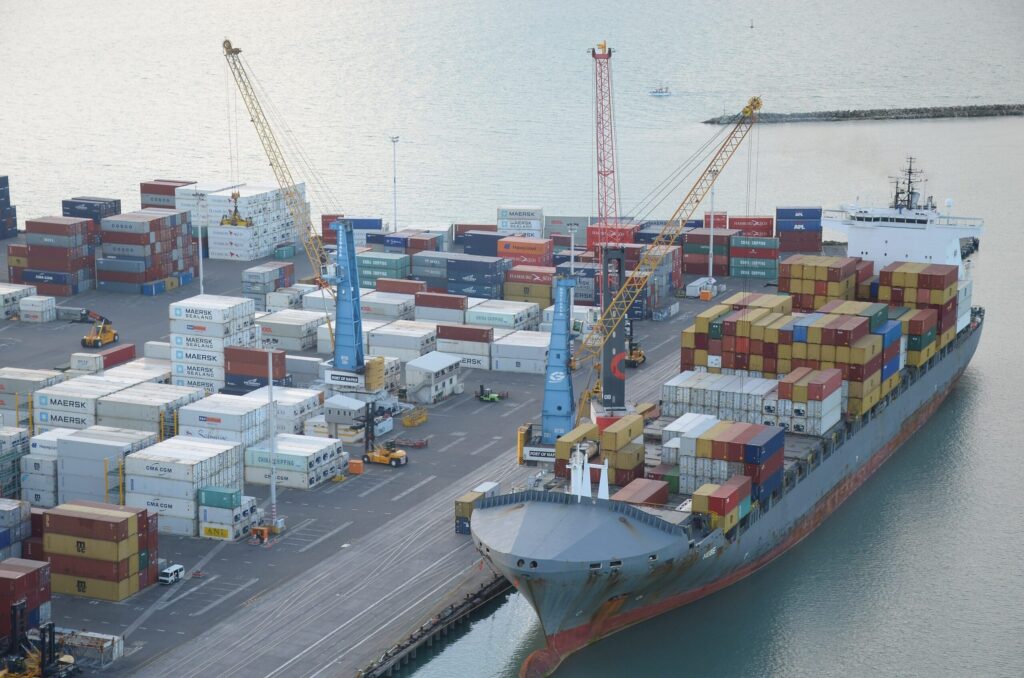Longshore Attorneys For Longshore & Harbor Workers Compensation Act Claim
New Orleans based Lavis Law Firm – Personal Injury & Accident Attorney knows The Longshore and Harbor Workers Compensation Act (LHWCA). The Longshore Act is administered by the U. S. Department of Labor Office of Workers’ Compensation Programs. The Act provides for no-fault benefits including, but not limited to, indemnity payments and medical care for certain employees disabled from injuries on navigable waters of the United States, or in adjoining areas customarily used in loading, unloading, repairing, or building a vessel.
The Act also offers benefits to dependents if the injury causes the employee’s death. These benefits are paid by an insurance company or by an employer who is authorized by the U.S. Department of Labor’s Office of Workers’ Compensation Programs to be self-insured. The term “injury” includes occupational disease arising out of employment.
How Do I Know If I am a Longshore Harbor Worker?
The Longshore Act covers employees engaged in maritime work or in maritime occupation – including longshore and harbor workers, shipbuilders, shipbreakers, and other maritime employees. To be covered, an injured employee must meet both the Situs and Status test of the LHWCA.

SITUS TEST requires an employee to be engaged in maritime employment in whole or in part upon the navigable waters of the United States. This includes adjoining wharves, dry-docks, piers, terminals, building ways, or other adjoining areas customarily used by an employer in loading, unloading, repairing, or building a vessel.
STATUS TEST requires that employees be engaged in maritime employment
An employee working on navigable waters in the course of his employment satisfies the test as does a worker not on navigable waters at the time of injury but is engaged in an integral part of maritime activity, such as loading, unloading, repairing or building a ship.
EXCLUDED WORKERS – The LHWCA excludes some injured workers from coverage who otherwise may be engaged in maritime employment if the injured worker is covered by state workers’ compensation law and falls in the following categories:
- Individuals exclusively performing office clerical, secretarial, security, or data processing work;
- Workers employed by a club, camp, recreational operation, restaurant, museum, or retail outlet;
- Workers employed by a marina and who are not engaged in construction, replacement, or expansion of such marina (except for routine maintenance);
- Workers who (A) are employed by suppliers, transporters, or vendors, (B) are temporarily doing business on the premises of a maritime employer, and (C) are not engaged in work normally performed by employees of that employer covered under this Act;
- Aquaculture workers;
- Individuals employed to build, repair, or dismantle any recreational vessel under sixty-five feet in length;
- Small vessel workers if exempt by certification of the Secretary of Labor under certain conditions.
- A master or member of a crew of any vessel;
- Any person engaged by a master to load or unload or repair any small vessel under eighteen tons net; and
- Employees of the United States government or of any state or foreign government.
What Are LHWCA Injury Benefits?
MEDICAL CARE – Includes all medical, surgical, and hospital treatment and other medical supplies and services required by the employment-related injury, as well as the cost of travel and mileage incidental to such treatment.
The employee may obtain medical treatment from a physician of his or her choice. The term “physician” includes doctors of medicine (MD), surgeons, podiatrists, dentists, clinical psychologists, optometrists, and osteopathic practitioners within the scope of their practice as defined by State law. Chiropractors are also included only to the extent that their treatment consists of manual manipulation of the spine to correct subluxation (dislocation).
An employee may not choose a physician who is currently not authorized by the Department of Labor to render medical care under the Act. The list of physicians not authorized is available from the local OWCP district office.
DISABILITY COMPENSATION – Compensation is paid every two weeks during an employee’s total disability because of a work-related injury.
Compensation is paid at a lesser rate if the employee is only partially disabled for his regular work.
Disability means the inability to earn the same wages earned at the time of injury. Compensation is payable for disabilities that are permanent total, temporary total, permanent partial, or temporary partial.
PERMANENT TOTAL AND TEMPORARY TOTAL DISABILITY – Compensation is two-thirds of the employee’s average weekly wage, subject to a maximum amount. The maximum rate payable for temporary total disability changes each October 1, based on the current National Average Weekly Wage for the affected period. Compensation for permanent total disability is adjusted each October 1, based on the percentage change in the national average weekly wage from the previous year, subject to a maximum adjustment of 5%.
PERMANENT PARTIAL DISABILITY – Compensation is payable for the permanent loss or loss of use of certain parts or functions of the body, such as the loss of the arm, hand, fingers, leg, foot, toes, hearing or vision. Compensation is payable for a certain number of weeks for each type of disability as specified in the Act. For example, total loss of use of a foot entitles the employee to 205 weeks of compensation.
TEMPORARY PARTIAL AND NON-SCHEDULED PERMANENT PARTIAL DISABILITY – Compensation is two-thirds of the employee’s weekly wage loss or loss of wage-earning capacity.
PERMANENT PARTIAL DISABILITY FOR RETIREES – If a worker suffers the onset of a latent occupational disease after retirement, compensation is two-thirds of the National Average Weekly Wage (NAWW) multiplied by the percentage of impairment resulting from the disease.
REHABILITATION – Vocational rehabilitation may include evaluation, testing, counseling, selective placement, and retraining if the employee is injured and cannot return to the former job. Rehabilitation services may include the cost of tuition, books, and supplies. A maintenance allowance not to exceed $25.00 per week is also provided during retraining. The cost of vocational rehabilitation services is paid by the U. S. Department of Labor. Contact your nearest district office if you are interested in these services.
What Are LHWCA Death Benefits?
DEATH BENEFITS are paid to a widow or widower or other eligible survivors if the injury causes the employee’s death. Reasonable funeral expenses are paid, up to a maximum of $3,000.
The widow or widower receives 50% of the average weekly wage of the deceased employee for life or until remarriage. Additional compensation is payable – 16 2/3% of the employee’s average weekly wage – for one or more children.
If children are the sole survivors, 50% of the employee’s average weekly wage is paid on behalf of the first child. Where more than one child is entitled to benefits, a maximum of 66 2/3% applies, shared equally.
OTHER ELIGIBLE SURVIVORS – parents, brothers, sisters, grandparents, and grand-children who were dependent on the employee.
Upon remarriage, a widow or widower receives a lump sum payment of compensation covering two years. Benefit payments to children, brothers, sisters, and grandchildren terminate when they reach 18, but may be extended to age 23 if the child or beneficiary is a student. Payments may continue indefinitely if a child remains incapable of self-support due to mental or physical disabilities.
In computing death benefits, the average weekly wage of the deceased shall be considered to have been not less than the national average weekly wage effective at the time of the employee’s death. The total amount of survivor benefits payable in death cases may not exceed the average weekly wage of the deceased or 200% of the national average weekly wage, whichever is less. Our Louisiana longshore harbor death benefits lawyer can also help if a loved one was killed while working on the job.
Maximum and Minimum Payments
Compensation payable under the Act may not exceed 200% of the national average weekly wage, applicable at the time of injury, or the employee’s full average weekly wage, whichever is less.
Waiting Period and Beginning of Compensation
NO COMPENSATION – is allowed for the first three days of disability unless disability lasts longer than fourteen days. In such cases compensation is paid from the first day of wage loss. The first installment of compensation is due 14 days after the employee begins to lose time from work due to the injury, or as directed by the OWCP.
KEY STEPS- What To Do If You Are Injured and Covered Under Longshore and Harbor Workers’ Compensation Act?
- NOTIFY your employer immediately. If you need medical treatment, ask your employer for a Form LS-1, which authorizes treatment by a doctor of your choice.
- OBTAIN medical treatment as soon as possible.
- GIVE written notice of your injury within 30 days to your employer on Form LS-201. Notice of death must also be given within 30 days. Additional time is provided for certain hearing loss and occupational disease claims. Contact your nearest OWCP district office for additional information regarding these types of claims.
- FILE a written claim for compensation within one year after the date of injury or last payment of compensation, whichever is later. A claim for survivor benefits must be filed within one year after the date of death. The time for filing claims in certain occupational disease cases has been extended to two years.
- If you are having any problems with your Longshore and Harbor Workers’ Compensation case, call me at 866-558-9151 (866-558-9151 FREE) or submit your inquiry online. Please be advised that you may be facing important legal deadlines so don’t delay.
- DEFENSE BASE ACT, applying to employment by Federal government contractors outside the continental U.S., Alaska, or Hawaii.
- OUTER CONTINENTAL SHELF LANDS ACT, applying to employees of private industry, who is not a seaman, conducting certain operations (such as the exploration or development of natural resources) on the Outer Continental Shelf of the United States.
- NON-APPROPRIATED FUND INSTRUMENTALITIES ACT, applying to civilian employees of non-appropriated fund instrumentalities (post exchanges, etc.) of the Armed Forces.
Contact Form
New Orleans Workers Compensation Lawyer Review

https://goo.gl/maps/AyvP13jRGNhoe5R46
Jump to a Section:
Toggle
